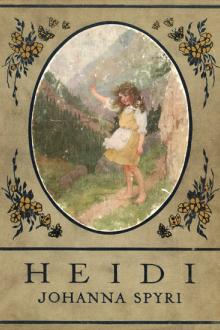Since "Heidi" has been so often translated into English it may well be asked why there is any need for a new version. The answer lies partly in the conventional character of the previous translations. Now, if there is any quality in "Heidi" that gives it a particular charm, that quality is freshness, absolute spontaneity. To be sure, the story is so attractive that it could never be wholly spoiled; but has not the reader the right to enjoy it in English at least very nearly as much as he could in German? The two languages are so different in nature that anything like a literal rendering of one into the other is sure to result in awkwardness and indirectness. Such a book must be not translated, but re-lived and re-created. Translated by Elisabeth P. Storkousin of his. We called him uncle, and because we are related on my father's side to nearly all the people in the hamlet they too all called him uncle. He was named 'Alm-Uncle' when he moved up to the Alm." "But what happened to Tobias?" asked Barbara eagerly. "Just wait. How can I tell you everything at once?" exclaimed Deta. "Tobias was an apprentice in Mels, and when he was made master, he came home to the village and married my sister Adelheid. They always had been fond of each other and they lived very happily as man and wife. But their joy was short. Two years afterwards, when Tobias was helping to build a house, a beam fell on him and killed him. Adelheid was thrown into a violent fever with grief and fright, and never recovered from it. She had never been strong and had often suffered from queer spells, when we did not know whether she was awake or asleep. Only a few weeks after Tobias's death they buried poor Adelheid. "People said that heaven had punished the uncle for his misde

Write Your Reviews